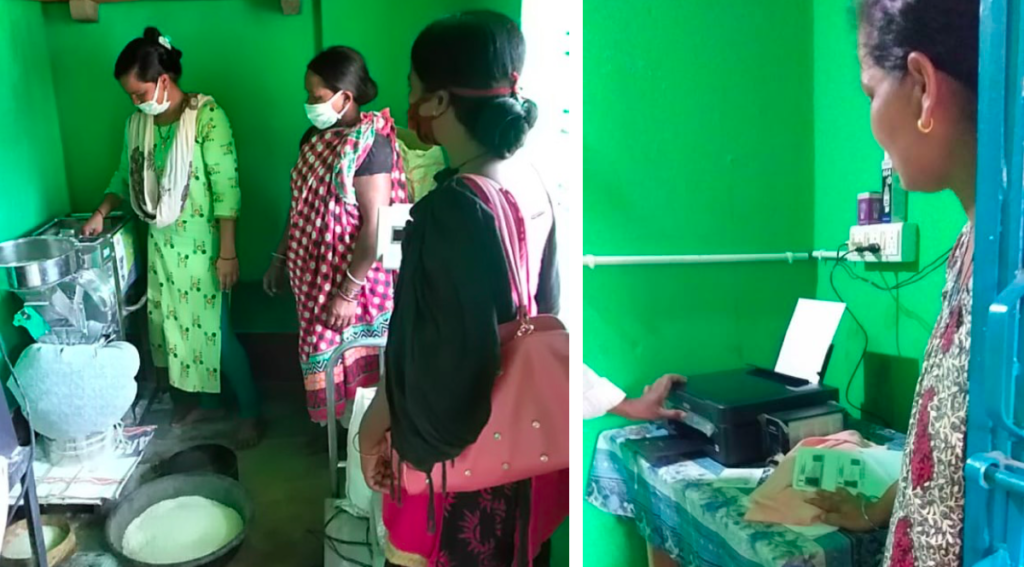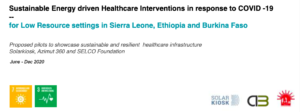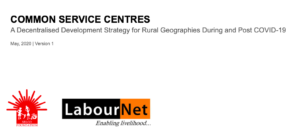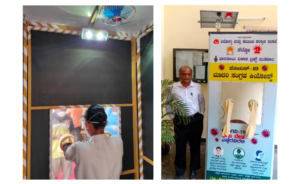Context
Koraput is a remote district in the state of Odisha with a predominantly tribal
population. Kanjariguda is a village in Lakshmipur block of Koraput district which is very
remote with tribal communities engaged in agriculture and NTFPs. The main crops
grown in this region are rice and ragi. To access basic services people in the region have
to walk kilometers across forests and mountains. Due to this reason, organizations such
as IGSSS and IDS, in partnership with SELCO got together to establish a livelihood
centre in order to decentralise critical services.
Need and Key Issues:
- Rice and Ragi: Rice is an important major crop in the area. The community is engaged in rice cultivation and would have to spend an entire day commuting – leaving early morning and returning late in the night just to get their rice, millets milled and to access other basic essential services. The amount spent for 50 Kg paddy hulling is INR 100. Also, the community has to travel 6-10 kms for hulling, which has its additional costs (economic and opportunity costs). The community is also engaged in ragi cultivation and is an important secondary crop after rice. A lot of drudgery is involved in turning the ragi grains to flour. The women would do this activity by hand, manually. In the larger flour mills, the community would pay around INR 4-5 per kg for milling their ragi produce.
- Mobile Charging: There would be heavy power cuts in the area ranging from 12-15 hours a day at times. To charge their mobile phones, the community would have to travel 15-20 kms and would have to pay INR 10 for each charge. The monthly expenses on mobile charging itself would amount to around INR 150 per phone.
- Printing and Photocopying: The community would have to travel 15-20 kms to access printing and photocopying services and would spend a day to access these services. They would require these photocopies and printouts for government documentation, school work and for other official purposes.
The Intervention
The main objective of the livelihood centre was to mitigate the drudgery, time, money and effort
expended by the communities in the nearby regions to access basic services. The livelihood centre was
proposed to be completely run and maintained by a Self Help Group (SHG), and the income from these
services are divided amongst the members. The centre has a plan to convert the space into a training
centre in the near future but has been stalled due to the lockdown.
The livelihood centre presently has a decentralised rice mill, ragi mill, a mobile charging unit, a
lok seva kendra (photocopier, printer and a camera) and a sewing machine. All the technological
interventions are solar powered and have been installed by a local enterprise, Shreyas Solar. The
installations were completed in February 2019.
COVID-19 Impact
As the region is very remote, the communities have not interacted with anyone post the lockdown. The
village is 12 kms away from Yeshmantpur which is the nearest large town where a patient was
detected positive post COVID testing. The patient has since been moved to the district hospital in
Koraput and the area has been strictly shut down. Since the past few weeks, the towns have been
opening up services have been disrupted due to a minimum of 4 hours of power cut every day- Unable
to procure diesel, leading them to close early. This has not been the case with the solar powered
Livelihood Centre run by the SHG.
For people to know about this centre in the wider region, it took 15 days of awareness building to link
the nearby villagers to this centre. IDS, the local NGO partner was doing mask distribution and other
relief work during which they informed the villagers of this centre. The sarpanch (village leader) has
also been immensely supportive of the centre from the start and has helped safeguard the SHG
members from any trouble or disruption from local police or other authorities. The people from 17
villages within the 12-15 km radius are now dependent on this centre for accessing essential services.
The local communities accessing the milling services do processing on a weekly basis and not on a
bulk basis. They do not have storage and there is no packaging system due to which they leave the
produce tied up in cloth or steel tins causing pest infestation. Weekly milling is very essential for the
communities for this reason.
- Solar Powered Printing/Photocopying Unit: During the COVID lockdown, the need for accessing photocopying and printing services has come down as there are no regular government services, employment related services or school supplies required. Due to this, the income has dropped to INR 1800 per month from INR 2500. However, with schemes, loans and other government services that will start to kick off, the need for this service is predicted to resume.
- Solar Powered Mobile Charging Unit: The mobile charging unit has 15 charging points allowing 15 mobiles to charge at the same time. The service was primarily used by school teachers, local youth especially during the rainy season when power cuts are at its highest. During the COVID lockdown, the number of people accessing this service has reduced as there have been protocols on physical distancing with people now being allowed to crowd the space. Per day there are 2-4 people who have been accessing this service.
- Solar Powered Rice Mill: Within Lakhimpur block, there are 500+ rice cultivating farmers associated with IDS. Initially, there was one machine which was milling both the rice and ragi in the same machine. But due to increased demand, two separate machines based on the requirements were designed by SELCO Foundation and installed in February, 2020. The mills are open from 7 AM to 7 PM with a 2 and a half hour break in between. During the lockdown, they are able to earn approximately INR 1200 per day.
- Solar Powered Millet Mill: Through the IDS program, there are 270 households cultivating ragi within Lakhimpur block itself who are promoted by the organization. Post the lockdown, the ragi mill is also running for 9 hours in a day, more or less being used constantly. The charges have been increased to INR 5 per kg (from INR 3 per kg) due to additional operational hours and people required. During the lockdown, the SHG is able to earn close to INR 700 per day from milling ragi.
- Solar Powered Sewing Machine: One sewing machine was installed, being used by the daughter of one of the SHG members. The local villagers give her their clothes on which she could do basic repair work and simple embroideries. She keeps half the income that she would get and gives the rest half to the SHG. Due to the lockdown, one of her uncles who owns a tailoring shop in Lakhimpur has had to shut shop and return to the village and will return post. He is very skilled and is using the solar powered sewing machine to take orders and stitch clothes, repair, do embroidery etc. He is using this time to teach the girl more advanced tailoring skills which she has successfully been picking up on. Due to this, the panchayat has given her the order to stitch all the 7th grade school uniforms for the coming year which will increase her income multifold.
KEY TAKEAWAYS
- Support from IDS: The NGO has been engaging in relief work across the region from the start of the lockdown. Due to their access to mobility, they have been inundated on the issues that the communities have been facing with lack of access to basic services during this period. They spent that time also creating awareness and informing those communities of the solar powered livelihood centre in Kanjariguda allowing people to resume accessing these services at this centre.
- Continued income and increased business in the future: Due to communities wanting to access these services, the SHG has continued to earn their income while many others with shops and services haven’t. With a lot more people from nearby villages being aware of this centre and accessing it, they have been expressing to the SHG on the convenience and their continued support to this centre post the lockdown as well.
- Panchayat support: Due to the sarpanch being involved right from the setting up of the centre and being supportive throughout, he has ensured that there is no form of harassment or disruption from any local authorities or other villagers on the centre’s activities.
- Energy Resilience: Due to powercuts, a lot of mills and other centres in towns have not been able to operate smoothly as diesel has not been available in required quantities or in convenient locations. However, the Kanjariguda livelihood centre has remained unaffected by these power cuts and lack of diesel availability due to it being solar powered with backup of 6 hours which is more than sufficient for all the services.
- One-stop shop: Due to the livelihood centre having multiple facilities under the same roof, it has been very convenient for the villagers to access these services. During the lockdown due to mobility being restricted, they would have been able to access a service or two if they were scattered. This has allowed for time and costs to be saved for these communities.






